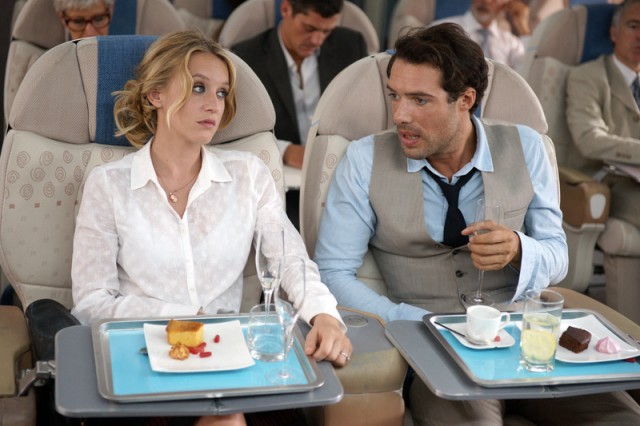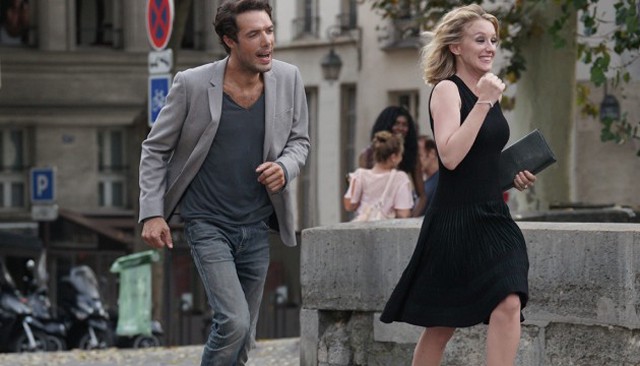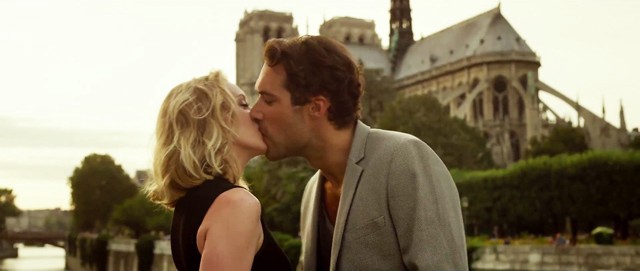The Hairpin Rom Com Club: Amour et Turbulences
by Chloe Angyal

Welcome back to The Hairpin Rom Com Club. It’s just like a book club, except you don’t have to politely hold your tongue as someone repeatedly raves that the twist ending “literally” blew their mind.
This week’s movie is in French, with English subtitles, which means watching requires actual reading. Before you say, “Oh, hell no” and close this tab, hear me out: this movie is worth a little extra brain labor. It’s genuinely funny, and the two lead actors are really quite charming. They both have pretty decent comic chops, and they have pretty good chemistry, which translates even if you’re reading the French-English translation. On their first date, annoyed by a rude fellow diner who is ignoring his wife to talk on his cell phone, the heroine seizes the phone and drops it in the man’s soup, as the hero looks on with a mix of disbelief and admiration. It’s funny in a violation-of-property-rights, shit-white-people-can-get-away-with kind of way.
Plus, when you’re done, you can casually drop the phrase, “that reminds me of this French romantic comedy I was watching the other day…” into everyday conversations. This might make you hate yourself a little bit, but it will also make you sound super fancy and sophisticated. For future reference, “I hate myself a little bit” in French is “Je me déteste un petit peu.”
Amour et Turbulences is about Julie (Ludivine Sagnier) and Antoine (Nicolas Bedos), who broke up three years ago but find themselves seated next to each other on a plane from New York to Paris. The story of their courtship, relationship, and break-up is told in flashback, and they rehash old issues loudly enough for their fellow passengers to hear it and to get invested in how this bottle episode is going to end.
When they first met, Antoine, a lawyer, was a shameless player. Julie was an artist who wanted to be unimpressed by Antoine’s smooth-as-beurre shtick but was actually pretty taken with it. They start dating and Antoine commits to Julie. Except he’s still a bit of an asshole. And by “a bit,” I mean that when Julie gets a scholarship to spend a year studying art in Tokyo, he tells the school that she wants to withdraw. They give the scholarship to someone else. When Julie finds out what he’s done, she trashes his apartment and walks out on him.
When we meet the couple again on the plane, Julie is engaged to a lovely, stable, boring man (this is a lovely, stable, boring rom-com plot device). She claims she is totally over Antoine. Spoiler alert, she’s not. Antoine is more forthcoming: he’s not over Julie. Stuck in the plane seat next to her, he does everything he can to win her back. He argues, reasons, begs, and pleads — he even uses one of those plane phones that hardly exist anymore to call his best friend and solicit his advice about how to correct what he considers the biggest mistake he ever made. After the plane lands, a series of unrealistic plot twists — unrealistic even by rom-com standards — Julie overhears Antoine tanking his job interview — which just so happens to be with Julie’s fiancé. She dumps the fiancé, and races after Antoine. Fin.

Amour et Turbulences is what film scholars such as Stanley Cavell call a “comedy of remarriage”: the central conflict is not whether the couple will get together, but whether they’ll get back together after falling apart. Sometimes, in a comedy of remarriage, one of the parties is already married to someone else (or basically married) and the plot is whether they’ll stay with their spouse or fall for someone else. And if you want to know more about comedies of remarriage: Stanley Cavell coined the term and literally wrote the book on them.
All rom-coms contain some element of reconciliation or temptation — the template is “boy meets girl, boy loses girl, boy gets girl back,” — but comedies of remarriage are a little more explicit about it, calling attention to the competition between old and new love. Lots of classic rom-coms are comedies of remarriage: His Girl Friday, Sleepless in Seattle, Bringing Up Baby, Adam’s Rib, and It Happened One Night, which I wrote about a few weeks ago. In His Girl Friday, for example, Cary Grant’s Walter makes the competition between himself and his ex-wife’s new fiancé, Bruce (played by serial nice boring guy Ralph Bellamy), very explicit, continually goading her about the boring suburban life that awaits her if she chooses Bruce instead of getting back with Walter. That comedies of remarriage became popular in the 1940s was no coincidence: divorce rates were rising, and with them, widespread cultural concern about the durability and relevance of the institution of marriage.
Against that backdrop, comedies of remarriage make the most sense; there was a spate of romantic comedies about divorced or separated couples reuniting and living happily ever after the second time around. Don’t worry, these movies seemed to say, this divorce thing isn’t going to totally change our culture and our understanding of gender. Whoops.
In a lot of comedies of remarriage, the eventual victor in the fight for the woman’s affections pitches himself as the more exciting option. This was true in His Girl Friday, and it’s certainly true in Amour et Turbulences. And, in a lot of romantic comedies, “exciting” is code for “drama and emotional fireworks that might indicate that we are in fact deeply incompatible. Your stable, not-borderline-alcoholic lawyer who doesn’t undermine your professional advancements? BORING. You’ll NEVER want to break everything in his apartment and storm out an emotional wreck. Your white-bread fiancé is never going to challenge our heroine the way he does, nor will he cause the kind of heartbreak that will make her run away to another country for an entire year to nurse emotional wounds. “But I totally did that!” this rom-com hero says. “Get back together with me!” In Amour et Turbulences, as in other parts of the rom-com universe, this pitch usually works.
That’s because, in the rom-com universe, true love is framed as something destructive, combustible, and therefore thrilling and good. Until we’re pushing 35 or debating Lori Gottlieb, we’re told that we’re not supposed to settle for someone who’s safe, or comfortable. We’re supposed to want constant fireworks. I don’t think a boring husband is a good idea (on screen or off), but the notion that the more challenging a relationship is, the better, strikes me as a law with diminishing returns. There’s a difference between someone who pushes you and someone who pushes you over the edge, someone who sometimes madly infuriates you and someone who gaslights you.

Amour et Turbulences also throws into relief something else that romantic comedies teach us about real life love, which is that a romantic relationship has to have a good story. Love isn’t enough. You need a love story. This desire for a good love story plays out in real life, too: one of the first questions you’ll be asked when you tell someone you’re dating a new person is “how did you meet?” This is totally reasonable — after all, humans tell stories to make sense of the world — but I’d argue that, in romantic comedies, the implications of this obsession with having a good story to tell are less than positive. In romantic comedies, in order for the story to be great, it has to be recognized as such, which means it has to have an audience. This results in spectacular climaxes. In rom-coms, true, powerful love, needs witnesses: this is why it’s so memorable when Hugh Grant gets caught kissing Martine McCutcheon in front of a crowded auditorium in Love Actually, or when Heath Ledger sings “Can’t Take My Eyes Off You,” complete with marching band accompaniment, in 10 Things I Hate About You.In this genre, climactic and intimate moments often take place in front of many, sometimes thousands, of people, and the line between public and private gets blurred.
In Amour et Turbulences, we’ll see how the “nice-stable-fiance-gets-shafted” narrative co-exists with ”make-your-love-story-into-a-compelling-love-story.” In this movie, like so many rom-coms, relationships become a spectator sport. It has a small audience — just a few passengers and a flight attendant — but they’re deeply invested in the outcome. True love, this movie tells us, will have a story thrilling enough to keep people rapt during a seven-hour transatlantic flight. That’s why in comedies of remarriage the stable fiancé never gets the girl. If you want to tell a good story, you’re going to need fireworks.
Chloe Angyal is a freelance journalist and is thisclose to getting her PhD in Romantic Comedies — er, Media Studies — from the University of New South Wales. You can read more of her writing here and follow her on Twitter at @chloeangyal.